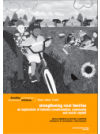Researchers spoke to many families living in the small Westland communities of Hari Hari and Whataroa to create 12 'stories' that were representative of families living there.
The study built up a picture of how these families developed social connections within the community and used them to help themselves and others.
Purpose
This project has used a social capital perspective to understand how rural families adjust to changes in the social and economic landscape. We have sought to understand how rural families participate in the accumulation and utilisation of social capital within their communities to bring about balance between paid work, community commitments and family life.
To achieve this broader aim we established two objectives:
1. To explore the relationship between family and community in order to understand how rural families draw upon, and contribute to, stocks of social capital. To do this, we have conceptualised families as ‘units’ and examined the contribution of social networks, civic participation, voluntary engagements and various other formal and informal arrangements to their social wellbeing. Our analysis is pitched at the interchange between family and community rather than within the family unit.
2. To carry out an examination of rural families’ wellbeing in the context of industry change. Industry and policy changes have brought job losses in one sector and rapid expansion in others, creating personal and collective difficulties for some rural families. This changing economic and social landscape, and the problems families and communities are facing, form the backdrop against which we have examined social capital in operation.
This approach has provided us with an opportunity to explore some of the mechanisms, approaches and strategies used by families to bring about balance between paid work, community commitments and family life in the context of industry change.
Key Results
Several key themes emerged from the families’ stories regarding how they have responded to change and the role of social capital in facilitating this response:
- Families’ sense of attachment to community: The capacity to build networks and social arrangements that facilitate participation in the generation of social capital grew for families as they developed their own sense of attachment and belonging to place.
- The importance of social networks in supporting families: The social networks and ties developed by families have been shown to be a critical asset for accessing the social and physical resources that promote family wellbeing.
- The social norms of trust and reciprocity: Trust, as a precursor to reciprocity, has allowed families to support others, and be supported by others. Apparent in many ways, from the social monitoring of children to the levels of trust demonstrated toward others in the community, high levels of trust and reciprocity have enabled families to ‘get ahead’ in the context of significant change.
- Balancing work, family life and community participation: In the face of changing social and economic circumstances, families indicate the necessity of working actively to achieve more balance between these aspects of their daily lives. One strategy for finding this balance is prioritising the allocation of time. In particular, the alignment of family and community commitments and the picking up by women of many family contributions and obligations have helped in finding this balance.

